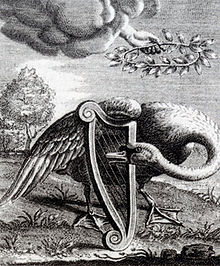Erinna
Appearance
Erinna (Greek: Ἤριννα) was an ancient Greek poetess. She is best known for her long poem The Distaff, a 300-line hexameter lament for her childhood friend Baucis, who had died shortly after her marriage. A large fragment of this poem was discovered in 1928 at Oxyrhynchus in Egypt. Along with The Distaff, three epigrams ascribed to Erinna are known, preserved in the Greek Anthology. Biographical details are uncertain. She is generally thought to have lived in the first half of the fourth century BC, though some ancient traditions have her as a contemporary of Sappho; Telos is generally considered to be her most likely birthplace, but Tenos, Teos, Rhodes, and Lesbos are all also mentioned by ancient sources as her home.
Quotes
[edit]- Στᾶλαι, καὶ Σειρῆνες ἐμαί, καὶ πένθιμε κρωσσέ,
ὅστις ἔχεις Ἀΐδα τὰν ὀλίγαν σποδιάν,
τοῖς ἐμὸν ἐρχομένοισι παρ᾿ ἠρίον εἴπατε χαίρειν,
αἴτ᾿ ἀστοὶ τελέθωντ᾿, αἴθ᾿ ἑτέρας πόλιος·
χὤτι με νύμφαν εὖσαν ἔχει τάφος, εἴπατε καὶ τό·
χὤτι πατήρ μ᾿ ἐκάλει Βαυκίδα, χὤτι γένος
Τηνία, ὡς εἰδῶντι· καὶ ὅττι μοι ἁ συνεταιρὶς
Ἤρινν᾿ ἐν τύμβῳ γράμμ᾿ ἐχάραξε τόδε.- Pillars of death! carv’d Syrens! tearful urns!
In whose sad keeping my poor dust is laid;
To him that near my tomb his footstep turns,
Stranger or Greek, bid hail! and say, a maid
Rests, in her bloom, below: her sire the name
Of Myrtis gave: her birth and lineage high:
And say, her bosom-friend Erinna came,
And on this marble grav’d her elegy. - Anthologia Palatina, vii, 710, as translated by C. A Elton, Specimens of the Classic Poets, Vol. 1 (1813), p. 117: "Epitaph on a Virgin of Mitylene, who died on her weddding-day"
- Other translations:Pillars of death, carved sirens, tearful urns,
In whose sad keeping my poor dust is laid,
To him, who near my tomb his footsteps turns,
Stranger or Greek, bid hail; and say a maid
Rests in her bloom below; her sire the name
Of Baucis gave; her birth and lineage high;
And say her bosom friend Erinna came
And on this tomb engraved her elegy.
—J. A. Symonds Jr, Studies of the Greek Poets, I, 2nd ed. (1876), p. 368: "Epitaph on a Young Girl"My funeral-shaft, and marble shapes that dwell
Beside it, and sad urn, receptacle
Of all I am, salute who seek the tomb,
If from my own, or other cities come;
And say to them, a bride I hither came,
Tenos my country, Baucis was my name.
Say also, this inscription for her friend
Erinna, handmaid of the Muses, penned.
—Richard Garnett, Idylls and Epigrams (1869), p. 39: "Baucis"
- Pillars of death! carv’d Syrens! tearful urns!
About
[edit]
- [Greek text]
- Erinna’s sweet crocus, maiden-hued.
- Meleager of Gadara, Anthologia Palatina, iv, 1, as translated by W. R. Paton, Greek Anthology, I (1916), p. 110
- Παυροεπὴς Ἤριννα, καὶ οὐ πολύμυθος ἀοιδαῖς:
ἀλλ᾽ ἔλαχεν Μούσας τοῦτο τὸ βαιὸν ἔπος.
τοιγάρτοι μνήμης οὐκ ἤμβροτεν, οὐδὲ μελαίνης
νυκτὸς ὑπὸ σκιερῇ κωλύεται πτέρυγι:
αἱ δ᾽ ἀναρίθμητοι νεαρῶν σωρηδὸν ἀοιδῶν
μυριάδες λήθῃ, ξεῖνε, μαραινόμεθα.
λωίτερος κύκνου μικρὸς θρόος ἠὲ κολοιῶν
κρωγμὸς ἐν εἰαριναῖς κιδνάμενος νεφέλαις.- Though short her strain nor sung with mighty boast,
Yet there the power of song had dwelling-room;
So lives her name for ever, nor lies lost
Beneath the shadow of the wings of gloom,
While bards of after days, in countless host,
Slumber and fade forgotten in the tomb.
Better the swan’s brief note than thousand cries
Of rooks in springtime blown about the skies. - Antipater of Sidon, Anthologia Palatina, vii, 713, as translated by A. J. Butler, Amaranth and Asphodel (1892), p. 59: "Preface to Êrinna’s Poems"
- Other translations:Brief is Erinna’s song, her lowly lay,
Yet there the Muses sing;
Therefore her memory doth not pass away,
Hid by Night’s shadowy wing!
But we,—new countless poets,—heaped and hurled
All in oblivion lie;
Better the swan’s chant than a windy world
Of rooks in the April sky!
—Andrew Lang, Grass of Parnassus, 2nd ed. (1892), "Erinna"Few are Erinna's lays, nor wordy are her songs,
But this her little work unto the Muse belongs.
Thus in remembrance she is held, no hidden thing,
That the black night conceals beneath its shadowy wing.
But we, the countless bards, O stranger, of today—
Our heaped-up myriads in oblivion pass away.
The low croon of the swan is better than in crowds
The jackdaws cawing far and wide through spring-time's clouds.
—Norman Douglas, Birds and Beasts of the Greek Anthology (1928), "A Muse among the Jackdaws"
- Though short her strain nor sung with mighty boast,

